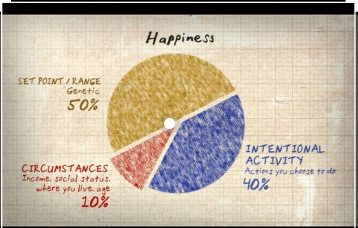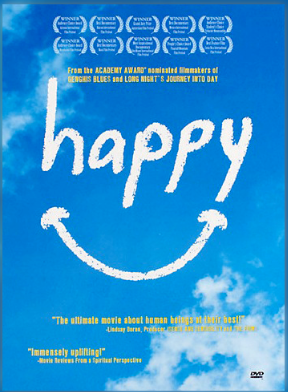A quick note about my previous post. I believe that all our decisions create probabilities or opportunities for us and using a grading system for our life choices doesn’t serve a greater purpose. That said, taking time to reflect on past decisions, owning and ultimately learning from them is the reason why we are here.
I have been thinking about happiness lately and have realized that it doesn’t take much to make me happy. Spending time with family and friends, golfing with my group, writing and eating pizza. Pretty simple.
Did you know there is a formula for happiness?
This formula has been based on research done in the field of happiness since the late 1970’s and the results of this research will surely surprise you. A good bit of that research and experts; Ed Diener, Richard Davidson, P. Read Montague and Daniel Gilbert, in addition to many more presented their findings in a documentary released in 2012 called “Happy”. I would like to share some of their insights with you.
If we looked at your total capacity to experience happiness, you would find that it is categorized into three groups: Genetics, Circumstances and Intentional Activity. Here are the contributions to your overall happiness from the three groups:

The largest contributor (50%) is genetics and it plays a part in your experiencing of happiness as it establishes your unique “Set Point…which refers to one’s genetically determined predisposition for happiness. This set point for happiness has been found to be responsible for about 50% of the differences in happiness from person to person.”
Here is the kicker…although 50% of your happiness quotient is genetic, only 10% is based on circumstances.
Income, how much stuff you have, social status, how famous you are and where you live only account for 10% of your happiness. Research has found that once you live above the poverty line (you can feed, house and clothe yourself) there is no difference in the happiness that you feel whether you make $500,000,000 or $50,000 dollars annually. What the research is saying, is that all that material “stuff” in your life is not affording you more happiness. And, here is why…
There is a theory called “The Hedonic Treadmill” and it goes like this:
“Regardless of what happens to people, their levels of happiness will eventually return to their baselines.” Take this theory with a classic example: say you get married, move into a new house, get a promotion, lose a job, suffer an accident, etc., over time, you’re likely to return to your set point of happiness.
There is an initial spike in happiness or sadness, but as time goes on, the feeling of happiness or sadness caused by an event starts to dissipate, and habituation kicks in.
After some time passes, you’ll be back at the level of happiness at which you were before. So, buy a new Ferrari, Chanel purse or even a winter home in Hawaii and as time passes, your happiness level will reach your baseline once again.
Philip Brickman and Donald T. Campbell coined the term in their essay “Hedonic Relativism and Planning the Good Society” (1971).
In fact, researchers studied 2 groups of people, a group that won the lottery and a group that because of an accident became paraplegics or quadriplegics and found that after the impact of both incidences subsided there were no real differences in any of the participants levels of happiness as a deviation from their original ‘set points’.
So, here is the best part…40% of our happiness can be attributed to how we choose to live life and the actions we take.
The movie “Happy” follows the lives of an eclectic variety of people from a rickshaw driver that lives in a slum in Kolkata, India, to a boat guide in the bayous of Louisiana, to a person who suffered a disfiguring vehicular accident to a bank director who quit his job and moved to help the sick and poor at the Missionaries of Charity in Kolkata, India. It is through the stories of these people and the results of years of research that the movie offers a formula for imbuing your life with happiness, and here is the “magic sauce” in a nutshell:
1. Relationships
Spending time with those you love being with, whether they be family, friends or colleagues on a regular basis is SO important. You cannot over value the joy that spending time with people that make you happy has on your quality of life. The Rickshaw driver that lives in the slums of Kolkata in a 1 room shanty, and whose level of happiness is no less that of the average American, looks so forward to coming home after work and spending time with his son at their favorite coffee shop. Or, the boat guide who lives a modest lifestyle that spends at least 1-2 times a week with his extended family of 12 of which have all grown up and live within miles of each other for the last 70 years. These relationships matter because they afford so much happiness.
2. Follow your Bliss (Joseph Campbell)
Do what makes you happy and try to do it often because the universe responds to the electromagnetic waves that you emit by giving you more of what it is that you focus your energy on. So, if you love surfing, then surf. If you love spending time with your pet, then do that.
The more you consume your time doing the things you love, the universe will respond by delivering new opportunities to do more of what you love doing.
3. Personal Growth
Whether its religion, spirituality or any other modality that you gravitate towards, personal growth can be a journey filled with introspection and pain which leads ultimately to happiness. The woman who was disfigured, had lived the life of a debutante before the accident, truly a charmed life in her opinion. After the accident, her life crumbled in a chain of unfortunate events; her husband divorced her, tragic events of sexual and physical abuse during childhood which had been walled off in her memory had surfaced, and daily contemplations of suicide forced her to choose life or death. By choosing life, she was able to heal the past and reinvent herself. She found and married her childhood friend and began seeing life from a totally new perspective.
A journey of personal growth can offer the keys to unlocking the treasure of happiness if you are willing to stay the course.
4. Physical Activity
When you walk, hike, run, climb, play sports or do any activity that puts you in “the flow,” your brain secretes a chemical called dopamine or the “feel-good” hormone. It is called that because its effects are as potent and give you a high like taking amphetamines might. Whatever your “activity” is, doing it consistently, creates super healthy effects. And here is why…
As a neurotransmitter, dopamine is involved in: Movement, Memory, Pleasurable reward and motivation, Behavior and cognition, Attention, Sleep and arousal, Mood, Learning and Lactation.https://my.clevelandclinic.org/health/articles/22581-dopamine
By failing to produce dopamine, your body begins to lose brain function that can inhibit your ability to remember and think. The more you perform some sort of physical activity you afford your body the ability to maintain its critical functions.
5. Help Others
Researchers have found when measuring happiness levels, that we achieve higher states of happiness when we do “stuff” for other people more so than when we do “stuff” for ourselves. The movie tells the story of a bank director who, after feeling unfulfilled, moved to Kolkata and began helping the indigent and ill for the Missionaries of Charity (Mother Theresa’s organization). He talks about the dichotomy of the lives he has lived. From caring about the clothes he wore to caring for people that can’t care for themselves. It was truly a humbling scene in the movie and reveals the true nature of why we are here and what we are intended to accomplish and the choice all of us have to make at some point in our lives – Service to Self or Service to Others?
